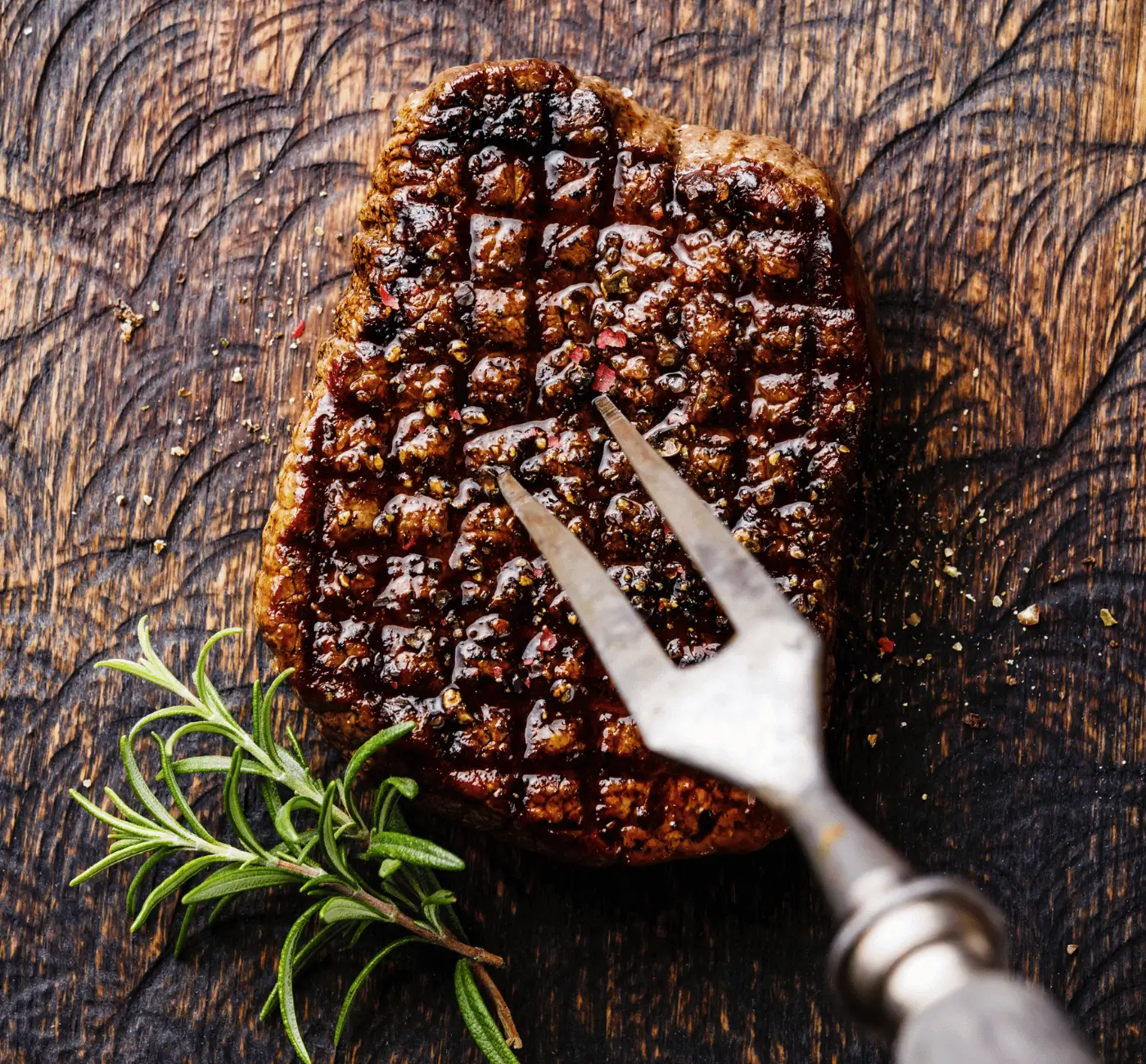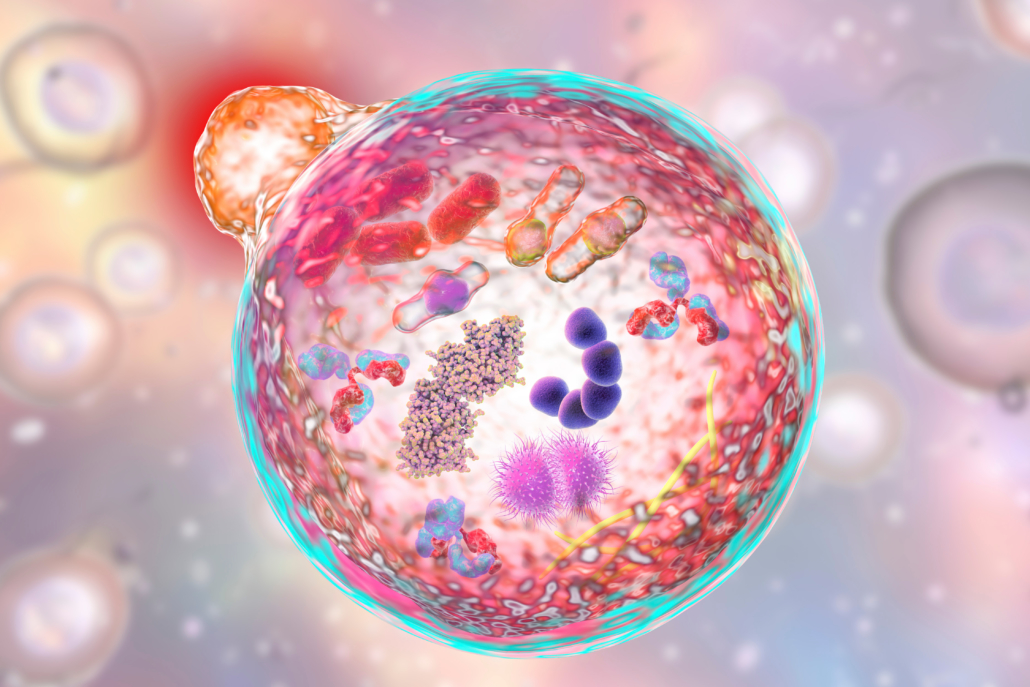
Autophagy means “self-devouring” and refers to a process by which old and damaged cells are broken down and their components recycled into new cells. Fasting is a safe and proven way of activating autophagy. Combine these two principles, and voila, you get the term, autophagy fasting.
In this article, we’ll explore how autophagy works, its importance and benefits, and how to fast and eat in order to jumpstart autophagy.

Autophagy fasting can be considered any form of fasting undertaken to induce autophagy.
Studies show that to trigger autophagy, you need to fast for 16-18 hours. However, the timing of your fast is paramount. [1] [2]
Autophagy only begins when fasting in alignment with your circadian rhythm–in other words, it must take place overnight. [3]

Though autophagy is often described as a process of cell death and renewal, it more often results in cell maintenance, protection, and survival. 1
In the case of surviving cells undergoing autophagy, the worn-out and damaged parts are recycled into fresh, functional parts, and the cell is given quality nutrients.
Here’s a technical breakdown of the process 2.
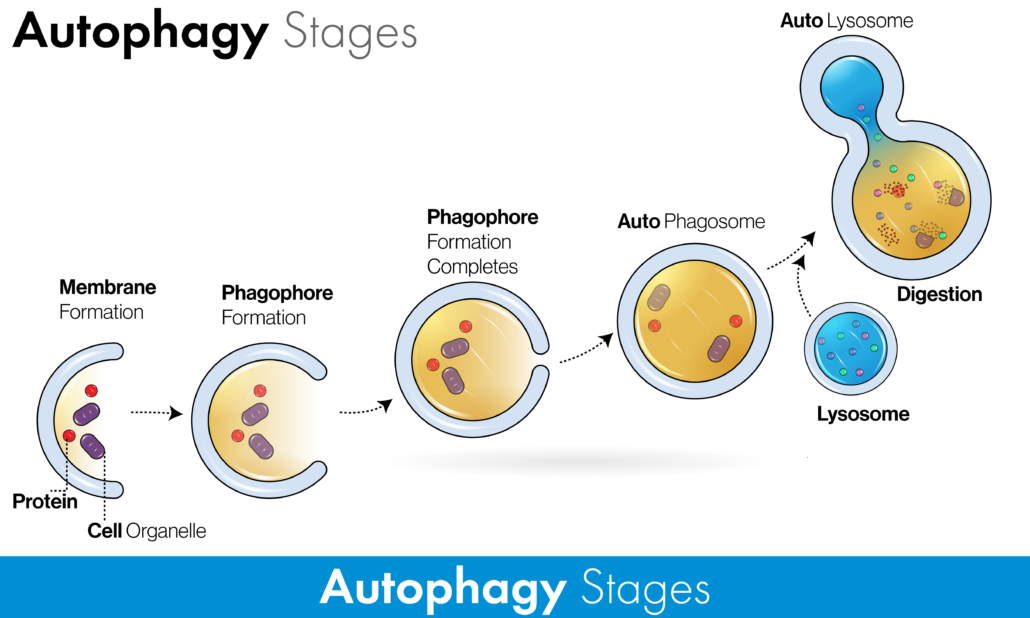
Autophagy is required for cell survival. Disrupting this process–often through poor diet and constant caloric intake– can lead to abnormal cell growth that contributes to various diseases. [4]
In addition to cleaning out misfolded proteins and damaged organelles, autophagy removes infectious and toxic bacteria and viruses, including mycobacterium tuberculosis, streptococcus, mycotoxins, and herpes simplex virus. [5] [6] [7] [8]
When autophagy is interrupted, it can lead to diseases, including diabetes, cancer, and infectious and neurological diseases.
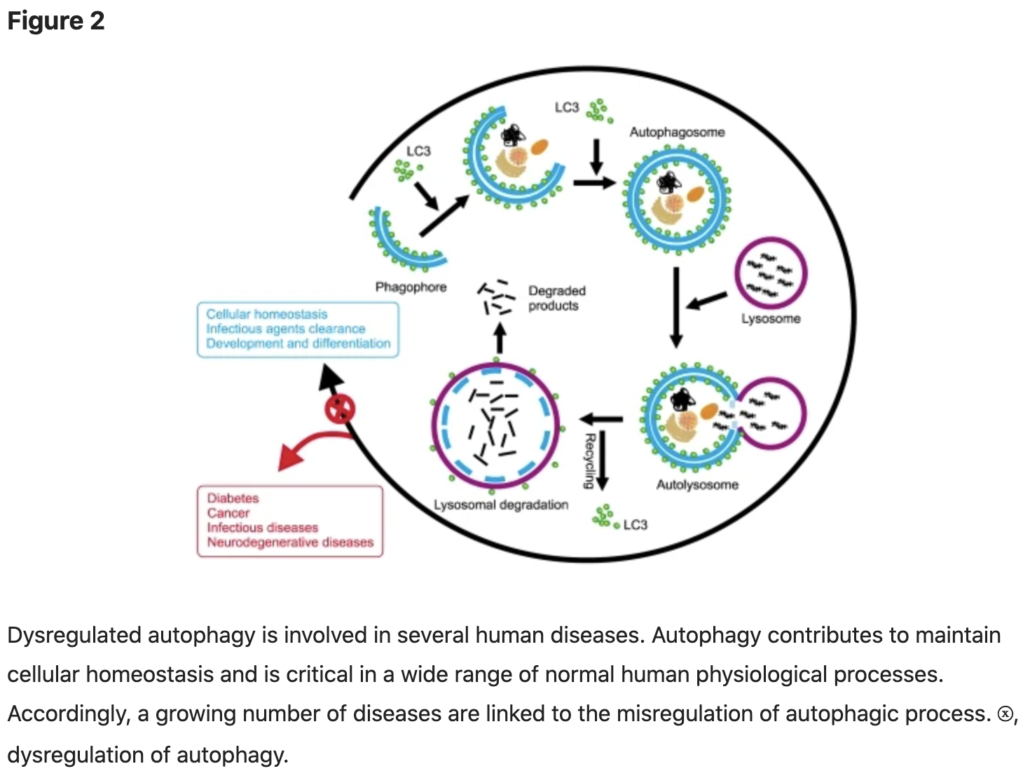
Source: Nature
Autophagy and its benefits are such an important emerging area of research that Yoshinori Ohsumi was awarded the 2016 Nobel Prize for Medicine for illuminating how the process works. [9]
Let’s take a closer look at how autophagy works and what benefits you can get by achieving autophagy through fasting.
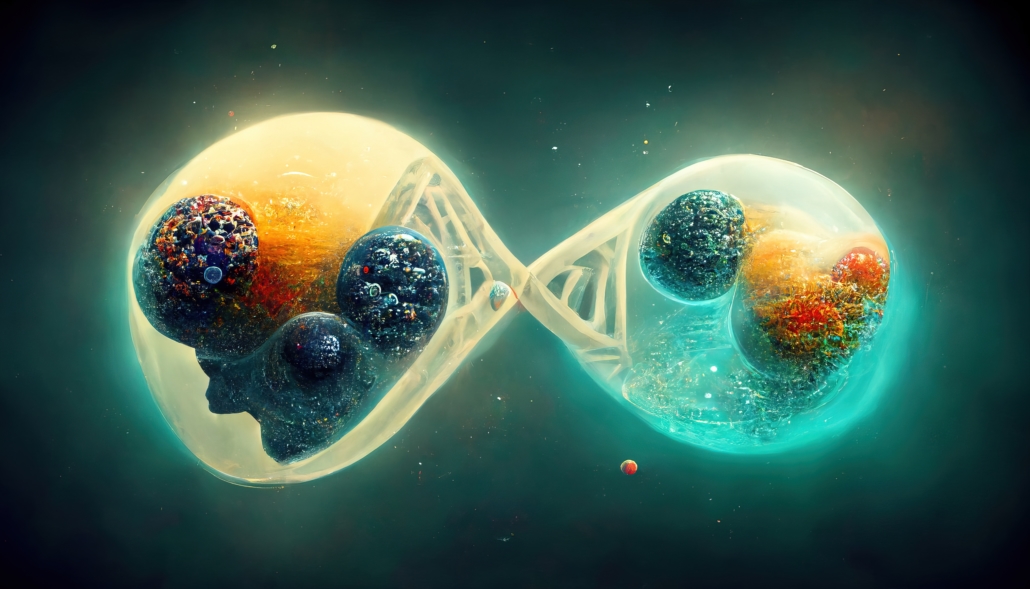
Autophagy keeps our cells fresh and healthy, but this process declines as we age.
Not surprisingly, fasting to promote autophagy is associated with anti-aging benefits. [10]
A 2019 study of 11 obese adults compared the effects of intermittent fasting with normal eating patterns. Researchers found that intermittent fasting resulted in longevity-promoting outcomes, including a 22% increase in autophagy gene LC3A after only four days. [11]
Inflammation is at the root of the so-called diseases of civilization, including heart disease, various cancers, osteoporosis, type-2 diabetes, and neurodegenerative disorders.
Fortunately, intermittent fasting has been shown to reduce chronic inflammation. [12]
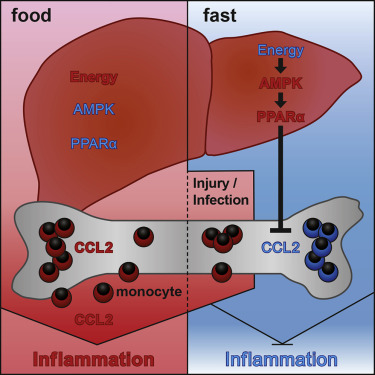
Source: Cell
A 2019 study found that intermittent fasting douses inflammation by reducing the presence of inflammatory cells called “monocytes.” [13]
The authors theorized that the reduction of monocytes by fasting isn’t a product of starvation/restriction. Rather, it’s a result of eating in greater alignment with our ancestral fasting/feasting cycles. In other words, it’s not about eating fewer calories, just eating them less often and from far fewer carbs.
Other studies reveal that autophagy is a key mediator of inflammation. [14] [15]
A balanced metabolic system where autophagy turns on and off with intermittent feeding patterns likely supports healthy (non-chronic) inflammatory responses.
The anti-cancer properties of autophagy is an emerging area of study with immense promise.
Early studies show that many cancerous cells can be eliminated through autophagy. [16] [17]
The exact mechanisms and degrees of autophagy to effectively prevent or treat cancer has yet to be thoroughly elucidated.
Preliminary studies looking specifically at the effects of fasting on cancer suggest that is may decrease chemotherapy-related toxicity and tumor growth. [18]
A 2015 study on mice found that intermittent fasting reduced the incidence of cancer. A pilot study by the same researchers on 19 people resulted in decreased risk factors and biomarkers for cancer. [19]
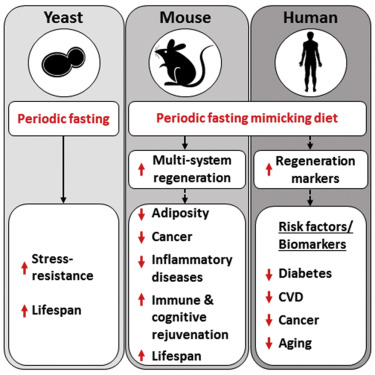
Source: Cell
A 2021 study looking at the relationship between autophagy and heart health acknowledged that autophagy “reverts and prevents vascular deterioration associated with aging and cardiovascular diseases.”
The researchers identified that autophagy supports heart health through numerous mechanisms–by eliminating cellular debris that causes oxidative stress and inflammation and by mobilizing fat stored in the liver and on the body into the powerful ketone energy molecule β-hydroxybutyrate (βHB).
Interestingly, the researchers hypothesize that the role autophagy plays in releasing BHB is the key factor in the neuroprotective properties associated with both keto diets and autophagy. [20]
A bare-bones approach to successfully kick your body into autophagy is to simply restrict your eating to a 6-8 hour window during the day.
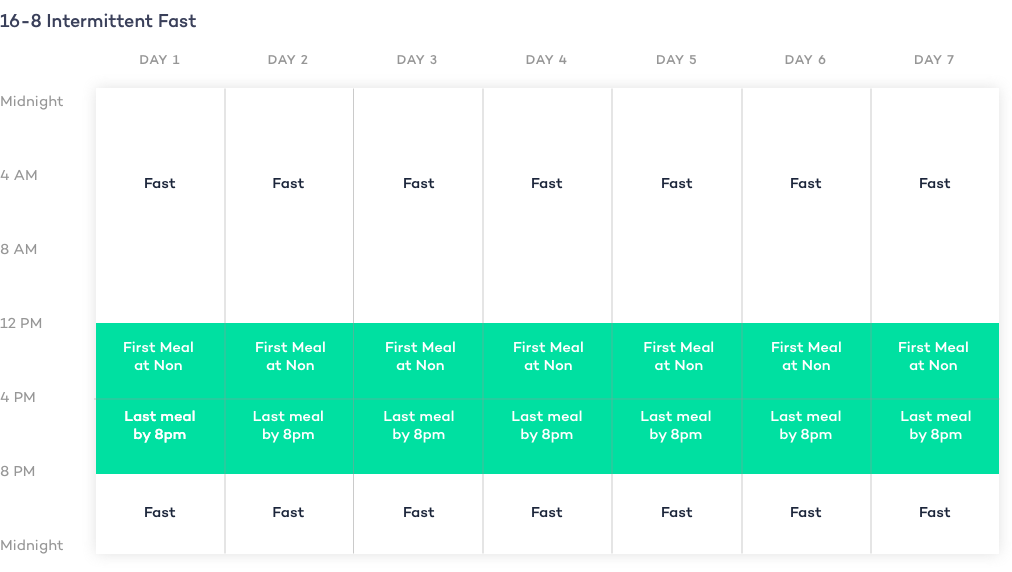
The 16/8 approach is a tried and true intermittent fasting plan that’s often a gateway into more intensive fasting protocols. OMAD, or one meal a day may be ideal for autophagy fasting when combined with ultra-satiating foods on a high-fat low-carb diet.
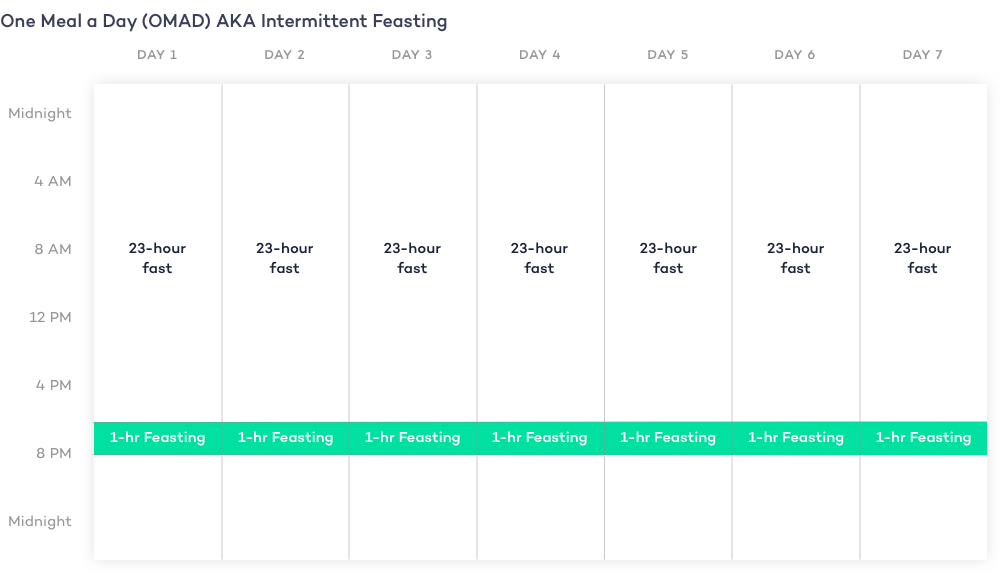
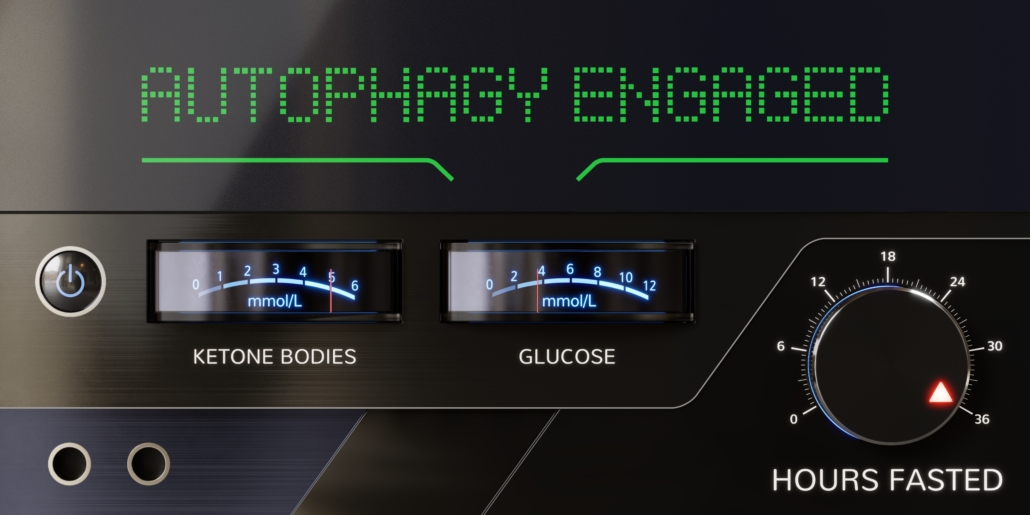
It is also possible to activate autophagy without fasting by consuming a high-fat low-carb ketogenic diet. But then you’d miss out on the other benefits of fasting.
We recommend combining intermittent fasting with high-fat low-carb eating.
High-fat low-carb approaches like Mediterranean keto and the all-meat carnivore diet provide dual benefits.

It’s worth highlighting that combining meat-centered low-carb high-fat eating with intermittent fasting is a way of mimicking ancestral eating patterns. For nearly 2 million years hunter gatherers feasted on the fatty meat of giant animals (megafauna), and fasted between successful hunts. [21]
No wonder that recreating this pattern confers so many powerful health benefits, including the vital process of autophagy. It’s the optimal way that evolution designed our bodies to receive and metabolize.
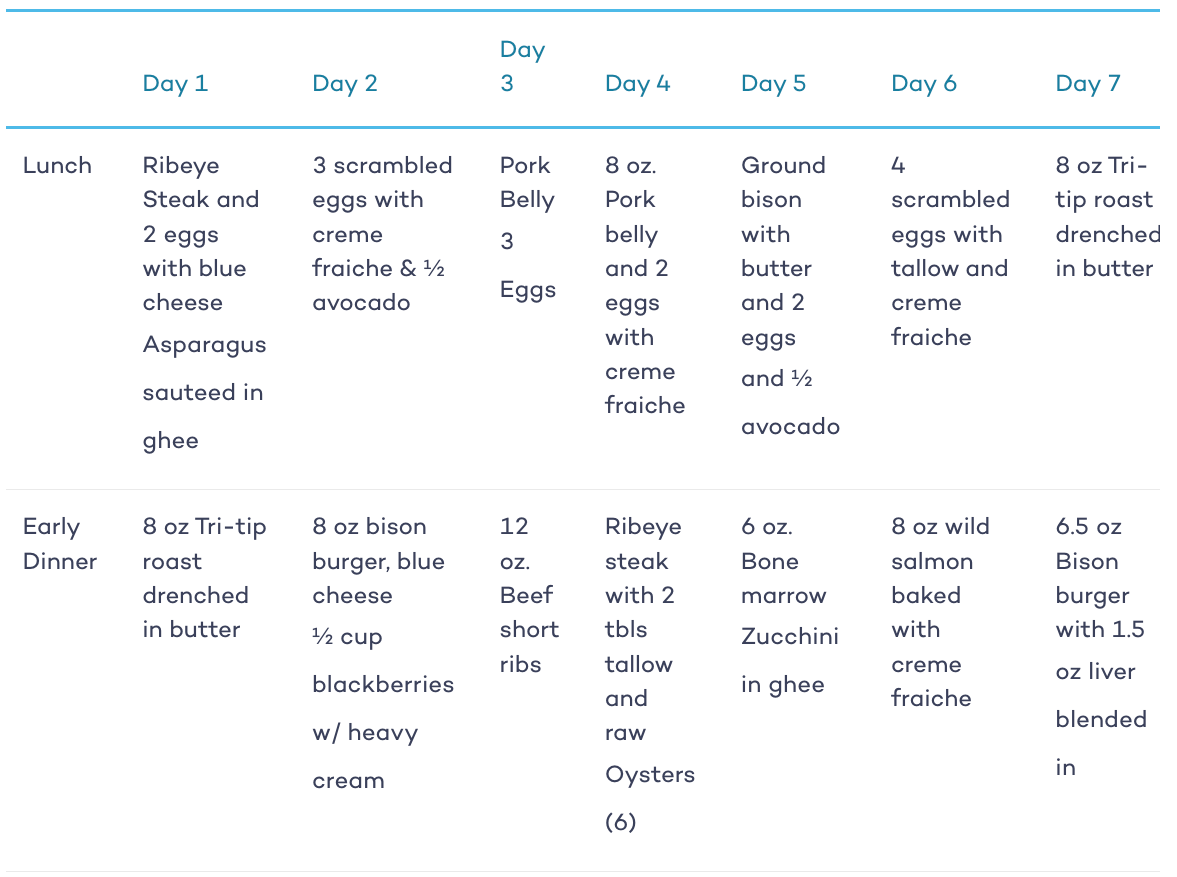
Coffee and tea without sugar or milk, sugar, or other additives may actually increase autophagy. [22]
You can also have coffee and tea with butter for a nourishing ketogenic or carnivore snack during feeding periods.
Autophagy is a process of cellular renewal that entails the elimination of damaged cell parts, regeneration of new cell parts, and even the death of cells.
Research on autophagy reveals that it is a critical process that
Intermittent fasting is a proven way to stimulate autophagy quickly. Combining autophagy fasting with a low-carb, high-fat diet centered around whole animal foods will nourish the autophagic process with an abundance of bioavailable nutrients needed to grow and restore healthy cells.
.png)
.png)
We’re a global community of seekers, healers, and doers committed to reclaiming health on our own terms. When you join the Kiltz Mighty Tribe (KMT), you’ll gain access to education, support, and collective wisdom.

